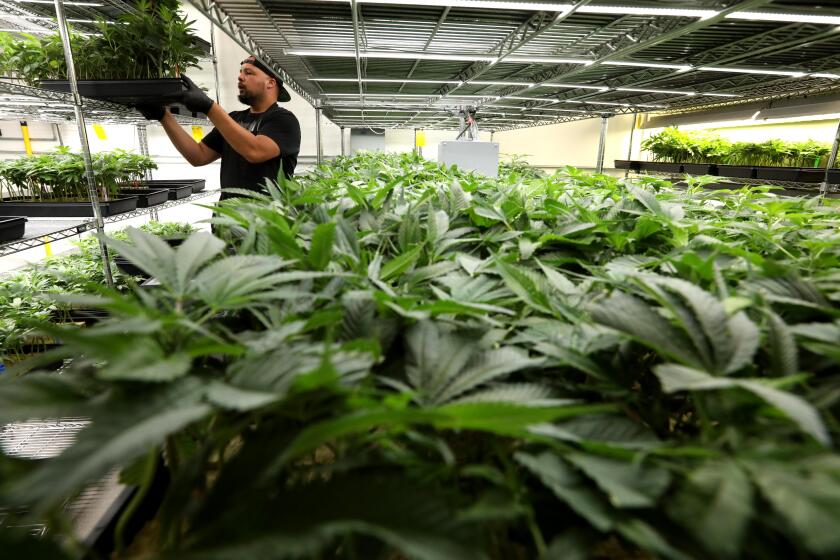MedMen’s fall shows the difficulties of the legal weed business
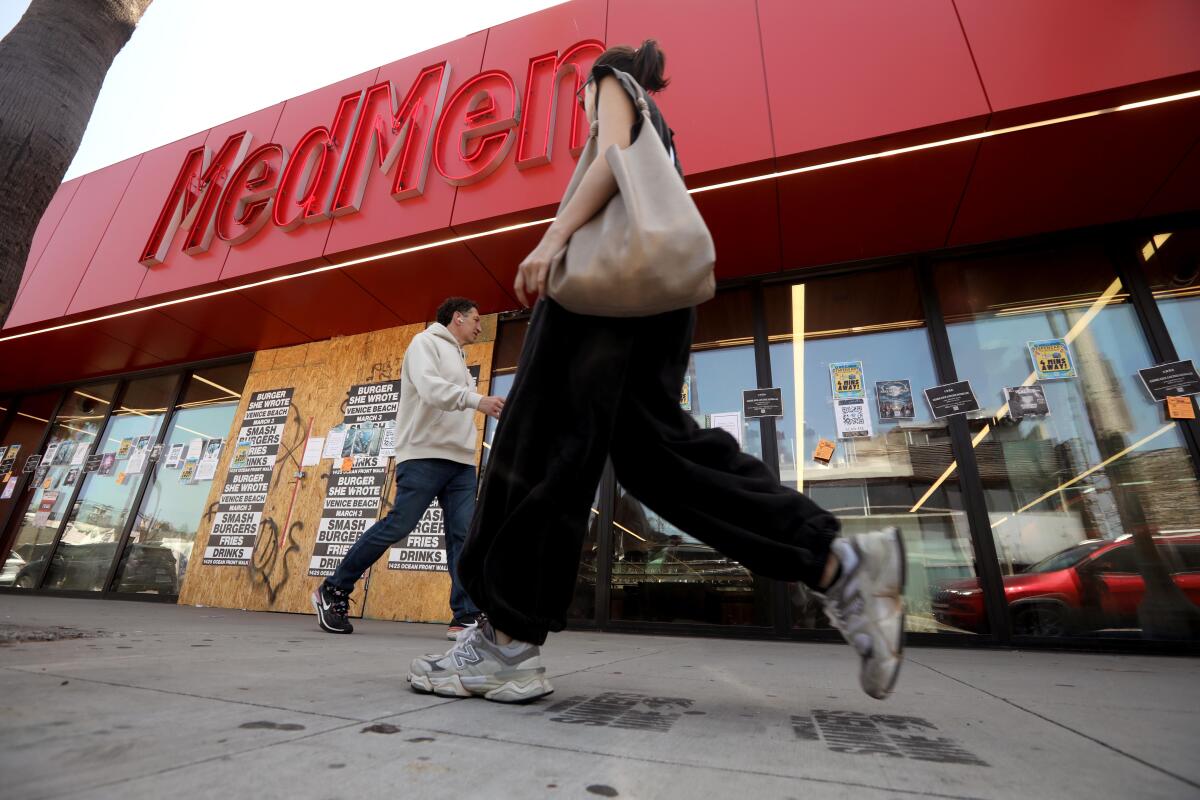
- Share via
In the summer of 2018, MedMen opened a boutique cannabis dispensary on Abbot Kinney Boulevard in Venice — “the coolest block in America,” as the company hyped in a news release at the time.
With natural light pouring through floor-to-ceiling windows and spacious display tables dotted with sleek tablets, company executives weren’t shy about where they’d drawn design inspiration for their high-rent storefront: They saw themselves as the Apple store of weed.
MedMen was an early darling in California’s recreational pot market, drawing attention from the media, politicians eager to align themselves with the burgeoning legal industry and a growing consumer base curious about the trendy new locations selling products with names such as L’Orange, Grape Gasby and Highuasca.
Flush with investors’ cash, the Culver City-based company poured $2 million into a “Forget Stoner” ad campaign, a marketing effort to counter the slacker pothead stereotype. And it expanded rapidly, opening more than a dozen locations across California, as well as stores in a few other states, including a boutique on Fifth Avenue in Manhattan. The sky, it seemed, was the limit.
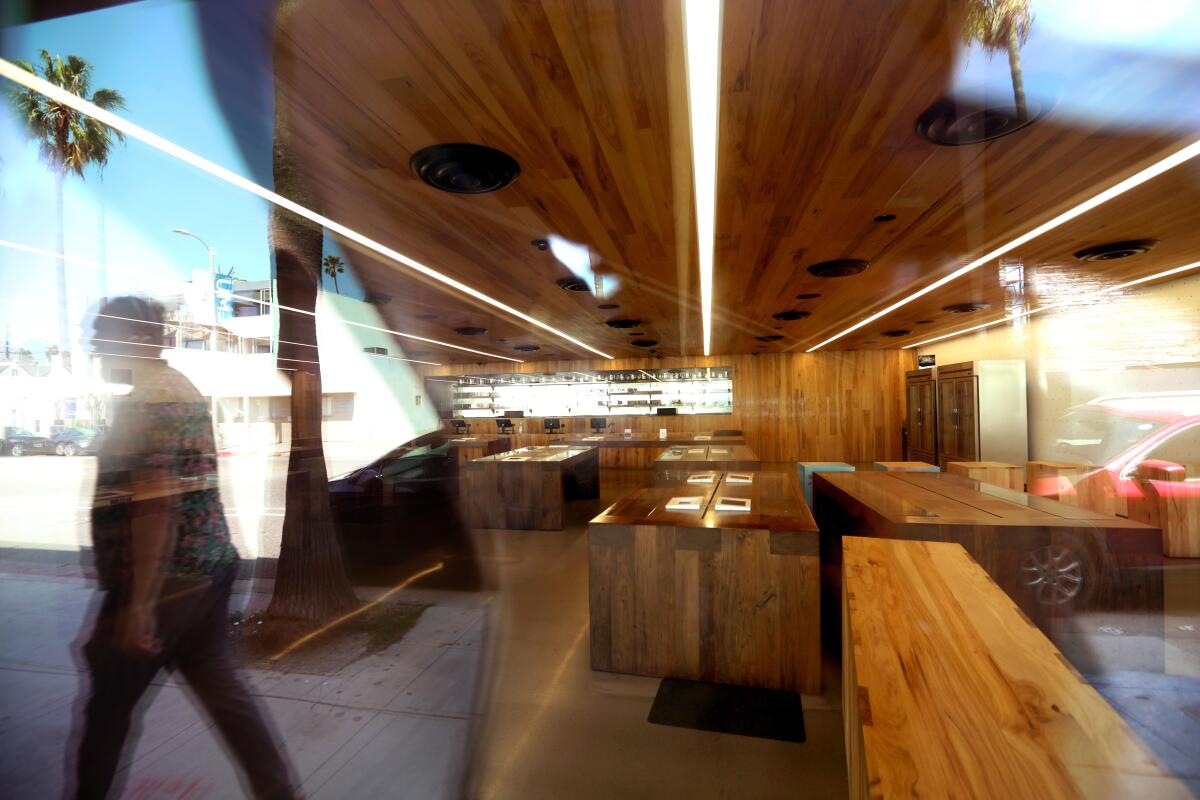
But today the once glitzy pioneer is teetering. Once valued at over a billion and a half dollars, MedMen has since seen its stock plummet to zero and been suspended on the Canadian stock exchange, where it was traded. Amid a flurry of lawsuits over alleged mismanagement and failure to pay its bills, the company’s chief executive and board chairman stepped down in January. And in recent weeks, MedMen has closed almost all of its 13 California locations, including the one on Abbot Kinney.
Along with internal turmoil, MedMen has been undone by larger market forces roiling California’s cannabis industry. For one, a glut of competitors flooded the market in the years after MedMen’s audacious arrival, looking to capitalize on California’s green rush. More than a few mimicked MedMen’s airy aesthetic. And as they battled to hold on to their market share in an increasingly crowded field, the company, like all cannabis purveyors, has had to face the challenges that come with selling a product the federal government considers illegal.
California’s legalization of recreational cannabis in 2016 ushered in a multibillion-dollar industry. But many of the promises of legalization have proved elusive.
Whether MedMen will survive for a second act remains to be seen. A chief restructuring officer has been brought on to try to save the company, which did not respond to requests for comment. MedMen’s Instagram and X accounts have been dormant since January, and its website, which has been down for more than a week, shows a man lying on his back smoking by the edge of a pool along with a short message:
“We’ll Be Back Soon.”
In the big business of cannabis, MedMen is hardly the only one struggling.
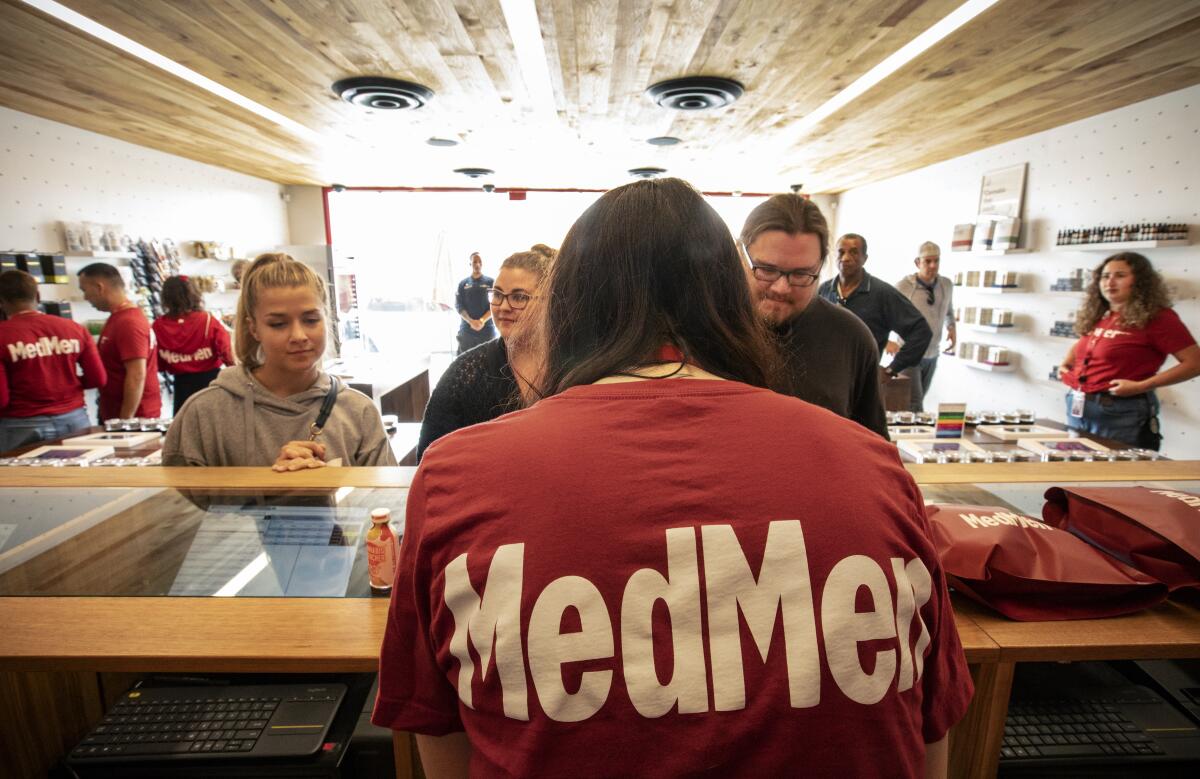
Many companies are draining into debt, trying to keep their doors open long enough to see a hoped-for day when the U.S. Drug Enforcement Administration moves cannabis — now a Schedule I drug alongside heroin, LSD and ecstasy — into the less tightly regulated Schedule III group.
As long as it remains illegal under federal law, industry experts said, many big financial institutions, who are fearful of the risks, will avoid working with cannabis companies, limiting their ability to get business loans, open bank accounts and accept credit cards.
As President Biden seeks support from young people, his administration is banking on cannabis policy as a potential draw.
That major obstacle has been compounded by the proliferation of low-budget, unlicensed dispensaries selling products at far cheaper prices than what MedMen and other upscale places charge. Along with the current inflationary period that has made running any retail business more expensive, it all combines into “a recipe for having to run a really, really tight ship to survive,” said Franklin Snyder, a professor of law at Texas A&M University, who studies the business and regulation of cannabis.
California officials are wondering why marijuana taxes haven’t turned out to be a cash cow. Here’s the reason.
Initial hopes about how much revenue and profit a cannabis retailer could make, Snyder said, were unrealistic.
“It was wildly overhyped.”
In 2014, Forbes wrote a piece detailing the “8 hottest publicly traded marijuana companies,” and Snyder tracked them for several years to see how someone would have fared if they had invested $1,000 into each at the time.
What started as $8,000, he said, would have dwindled to $249 by 2022.
Robert Solomon, co-chair of the UC Irvine Center for the Study of Cannabis, said that a gateway to greater profitability still exists, but hinges largely on when the federal government reschedules cannabis — if it ever does.
“It could happen tomorrow or it could happen in seven years,” Solomon said. “It’s just a crazy situation.”
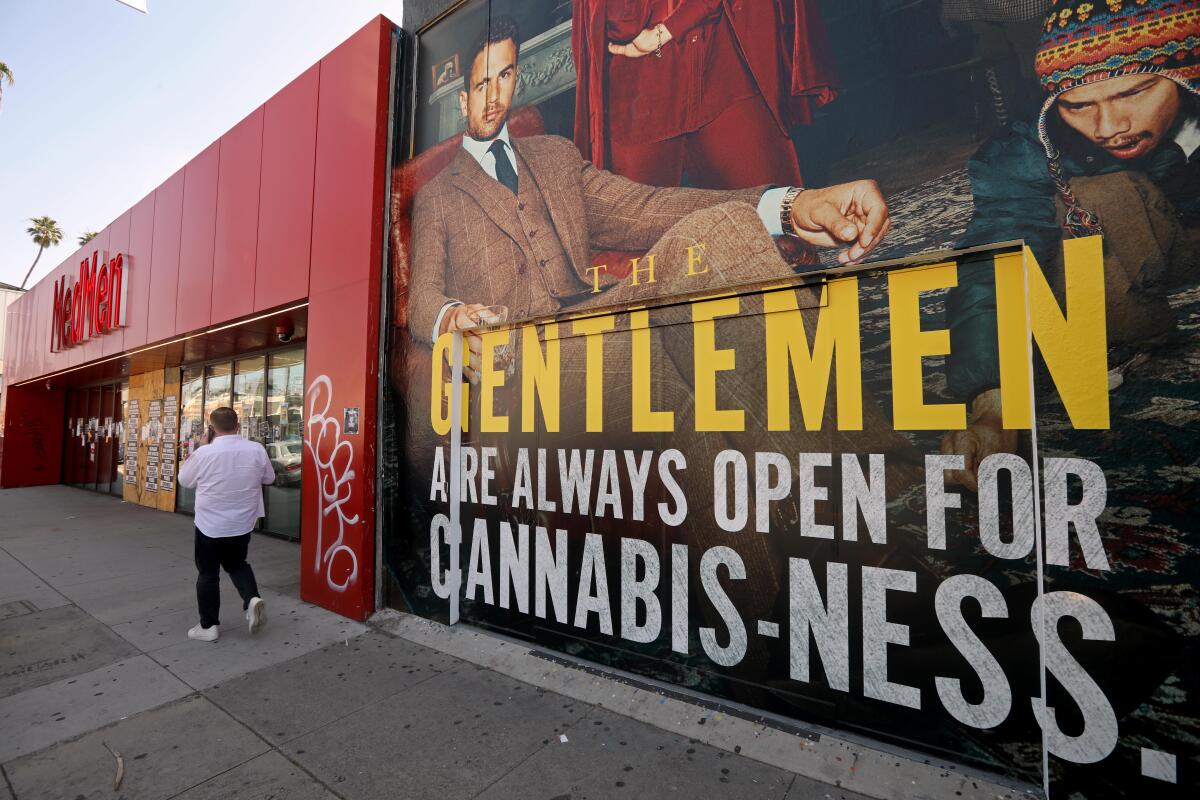
Until then, he said, cannabis businesses will continue paying much higher tax bills than most other companies, because of a section of the federal tax code that prevents companies from taking typical business deductions from gross income associated with selling Schedule I or II substances.
“What was supposed to be a lucrative business ended up being a very, very marginal business or maybe one with no profit at all,” he said. “But big capital is waiting. I think there is a lot of capital, and if we see rescheduling, we’ll see a big influx.”
The capital that has flowed into the legal market so far has largely gone to big outfits such as MedMen, said Bonita Money, founder of the L.A.-based National Diversity and Inclusion Cannabis Alliance.
Largely left out, she said, have been social equity applicants — Black and Latino entrepreneurs, who despite vows from politicians that legalization would help atone for years of disproportionate criminalization during the war on drugs, have faced an essentially impossible combination of delays and lack of access to sufficient capital. Many have lost their life savings in the process.
“I’ve watched this industry just totally become rancid,” Money said. “We thought as we regulated and went legal, it was something that would be a fair and equitable market, and it’s gotten worse.”
Despite industrywide struggles, some companies have managed to continue expanding.
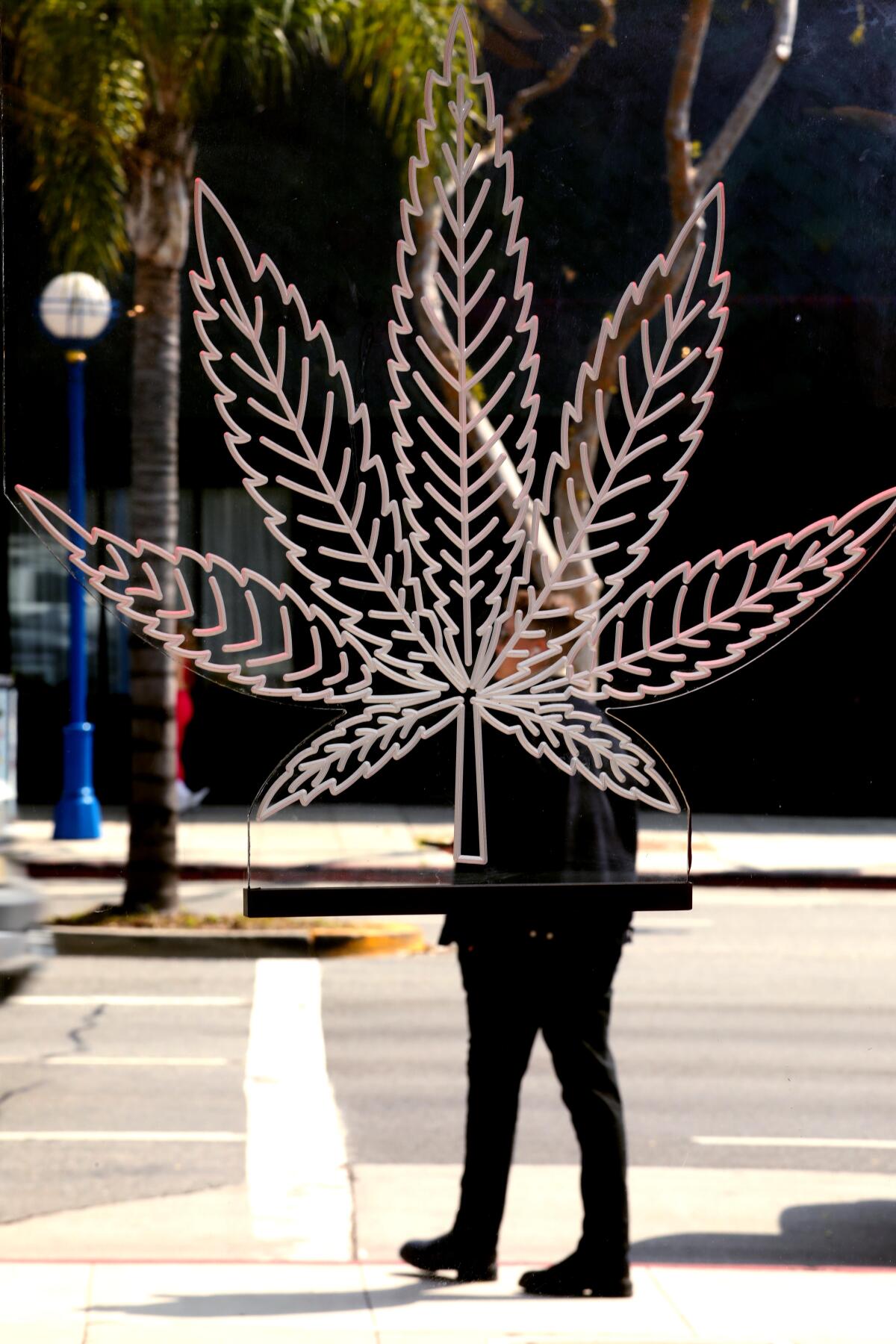
The Artist Tree — a cannabis retailer whose shops are part high-end dispensary, part art gallery — opened its first location in West Hollywood in 2019 and slowly added six others across the state, including locations in Koreatown and Beverly Grove.
The company, which plans to open in Laguna Woods, Hawthorne and Riverside in the coming months, has tried to set itself apart from other retailers by showcasing and selling work from local artists and hosting comedy and drag shows at a lounge at its West Hollywood location, said Lauren Fontein, the company’s co-founder and co-owner.
But the market, she acknowledged, has gotten increasingly saturated with competition in Los Angeles, both from the higher-end, design-focused cohort that MedMen helped usher in and unlicensed shops.

“The industry is changing and struggling right now and it’s hard in retail,” she said, adding that, on average, customer visits and sales at the three L.A. County locations have dropped by around 15% since 2021.
“I think that’s a reflection of the economy at large.”
Such problems weren’t on people’s minds in MedMen’s early days, when long lines of customers snaked outside the door of its West Hollywood shop on Santa Monica Boulevard, where budtenders dressed in shirts that read “It’s legal” patiently answered their questions.
Influential Angelenos, including Rep. Ted Lieu (D-Torrance) and actor Rosario Dawson, posed for pictures at the ribbon cutting on Abbot Kinney. Gwyneth Paltrow’s wellness empire Goop announced a collaboration with the cannabis company, and former L.A. Mayor Antonio Villaraigosa joined the company’s board.
“Folks who could come in and make it cool and classy and something where you might see the occasional Hollywood glitterati-type wandering through, those became successful in part because there wasn’t much competition,” said Snyder, the Texas A&M law professor. “The first people to open were making money hand over fist.”
But things quickly began to unravel.
In early 2019, the retailer’s former chief financial officer sued the company, alleging he was forced out for complaining about what he characterized as misdeeds by other leaders.
As California’s marijuana industry works to project an image of mainstream respectability, one of its best-known companies has come under attack by a former insider.
A slew of other lawsuits soon followed — from a technology firm, a distribution company and a pair of landlords — all accusing the company of failing to pay for either services rendered, supplies provided or rent for a retail space in Pasadena.
The company’s financial situation has grown increasingly dire. In a filing with the Securities and Exchange Commission summarizing its finances at the end of 2022, the company warned that its dwindling cash reserves and mounting debt raised “substantial doubt with respect to the company’s ability to meet its obligations for at least one year.”
Then, in the first quarter of last year, the last period for which the company has provided detailed financial information to U.S. regulators, MedMen posted losses of more than $31 million and said its revenue had dropped nearly 23% from the same period the previous year. The company noted that at the time it had more than $474 million in liabilities and less than $9 million in cash on hand.
Earlier this year, MedMen filed paperwork with regulators announcing that its CEO, Ellen Deutsch Harrison, who had been in the job less than a year, was stepping down along with the executive chairman of the board.
Outside the Abbot Kinney location on a recent afternoon, the doors had been covered with large wood panels and padlocked shut. Fliers advertising other nearby dispensaries blanketed the wood, along with a small sign that read: “After 5 wonderful years, we will be temporarily closing our doors.”
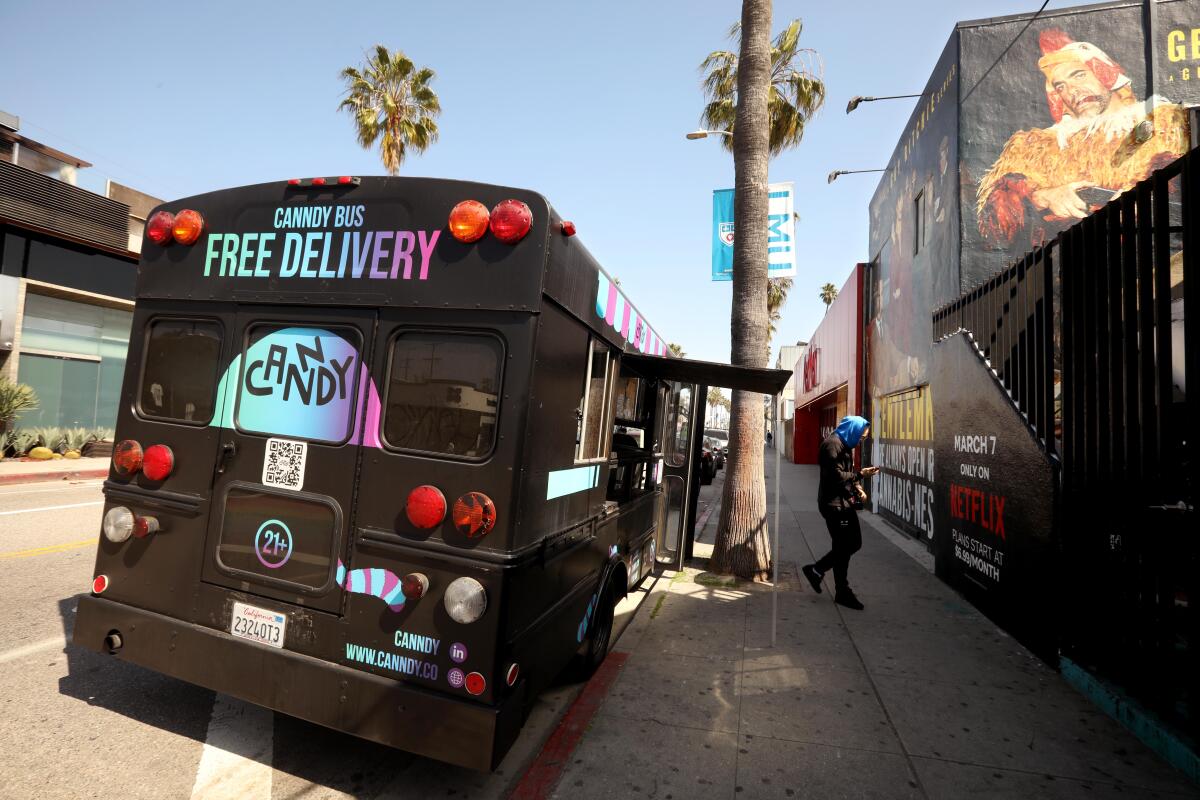
Parked a few feet away was a mobile dispensary from a company called Canndy, which opened in the fall and sells a sparse menu of prerolls and edibles from a refurbished school bus.
The company’s co-founder, Andrija Vukovic, noticed the MedMen location was preparing to close earlier in the month and has been parking nearby everyday since, banking on a steady flow of disappointed MedMen customers arriving to find locked doors.
Despite a distinctly more casual vibe than MedMen — a slogan painted on the bus reads “Low profile, High times” — Vukovic’s plan has worked. He said he’s getting 30 or so customers a day, adding that it took the company months to build up to that level of sales with its other bus, which parks in Hollywood.
“It’s all people who come ready to shop,” he said. “We’re doing really well ‘cause of MedMen’s rejects.”
Times staff photographer Genaro Molina contributed to this report.
More to Read
Sign up for This Evening's Big Stories
Catch up on the day with the 7 biggest L.A. Times stories in your inbox every weekday evening.
You may occasionally receive promotional content from the Los Angeles Times.


